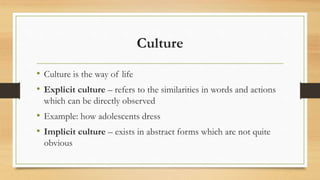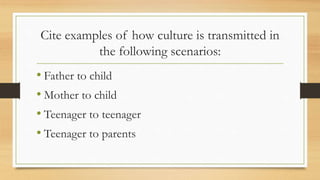This document discusses the colonial origins of social sciences and efforts to decolonize and indigenize them, using examples from the Philippines. It describes how early Western social sciences were complicit in colonial projects and imposed Eurocentric frameworks. It then outlines the development of Sikolohiyang Pilipino (Filipino Psychology) from the 1960s onward, which challenged Western concepts and focused on indigenous cultural forms and experiences. The document discusses key figures who advocated for indigenization and describes some of Sikolohiyang Pilipino's strategies like participatory research methods. Finally, it notes ongoing efforts to reconstruct psychology in a way that is tailored to the local Filipino context and experience.












![Feminist Approach
• Henrietta L. Moore (2010) defines the feminist reorientation in
anthropology:
• Feminist anthropology is concerned with critically examining relations
between women and men, and investigating how gender, embodiment and
sexuality are produced through complex relays of power involving ideologies
and social institutions. Its focus of analysis has shifted over time, moving
from an initial emphasis on women to a concern with gender relations, issues
of difference and identity, and sexuality and heteronormativity (strict
distinction between male and female sexes]](https://image.slidesharecdn.com/crossculture-230324030033-e2a8b722/85/CrossCultureUCSP-pptx-13-320.jpg)














